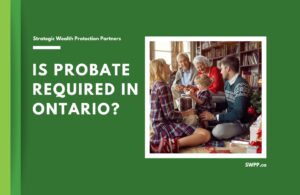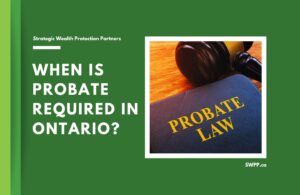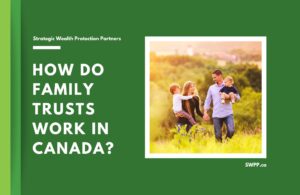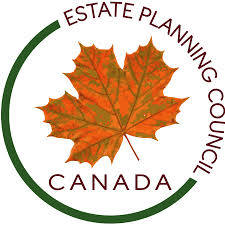Written by Ron Cooke, President & Founder of Strategic Wealth Protection Partners in Ontario, CEA®, Member of the Estate Planning Council Canada
If you’re wondering how to avoid paying capital gains tax on inherited property in Ontario, you’re not alone.
It’s a common question because nobody wants a huge surprise tax hit when they get an inheritance.
Many families are surprised to learn that there can be a significant tax bill when someone passes away and leaves property behind. But the good news is, with the right planning, there are ways to reduce or manage that tax burden.
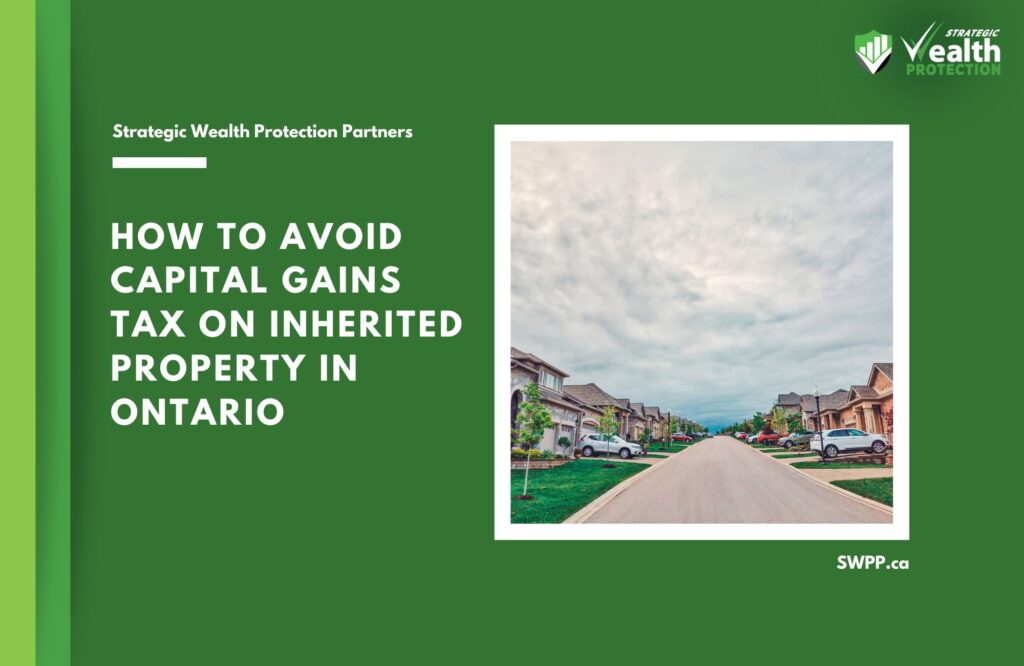
Capital gains tax on inherited property is usually paid by the estate, not the person receiving the inheritance.
When someone dies owning real estate other than their principal residence, the Canada Revenue Agency treats it as though they sold that property on the day they died. This is called a “deemed disposition.”
The estate must report the property’s fair market value at the time of death and compare it to the adjusted cost base.
The adjusted cost base is what they originally paid for the property, plus certain expenses like renovations. If there’s a gain, it is taxed as a capital gain on the final tax return of the deceased.
However, the rules are different depending on the type of property:
- A primary residence (like a home you live in) may qualify for the Principal Residence Exemption, which can eliminate capital gains tax entirely.
- A secondary residence (like a cottage, rental property, or investment property) is usually subject to capital gains tax at death, with no exemption.
Now, what happens to the person who inherits the property?
If you inherit the property, you don’t usually pay capital gains tax right away. Instead, you inherit the property at its current market value, which is known as a step-up in basis. That means your future capital gains tax will only apply if and when you sell the property.
You will only be taxed on the amount the property has increased in value since the date of inheritance.
What Are Capital Gains in Ontario?
A capital gain happens when you sell or are deemed to have sold a property or investment for more than you paid for it.
In Ontario, when someone passes away, the Canada Revenue Agency treats many estate assets as if they were sold at fair market value on the date of death.
This means capital gains tax applies to the increase in value, and half of the gain is included as taxable income on the deceased’s final return.
This rule applies to real estate, mutual funds, and other investments unless an exemption or deferral is available.

Who Pays Capital Gains on Inherited Property in Ontario?
The estate, not the beneficiary, is responsible for paying capital gains tax when someone dies.
The deceased’s estate must pay taxes on the gain through the final return before distributing assets. Once taxes are paid, the beneficiary inherits the property at its new fair market value.
If the property is later sold, capital gains tax applies only to the increase in value after the date of inheritance.
How Can You Avoid Capital Gains Tax on Property Upon Death?
In most cases you cannot eliminate capital gains tax completely.
However, there are exemptions and planning strategies that can defer or reduce the impact.
- If a spouse dies, property can transfer to the surviving spouse or common-law partner through a spousal rollover, which defers the capital gains until that spouse dies or sells the property.
- The principal residence exemption can also apply to one property, which may eliminate some of the gain.
- Trusts, life insurance, and thoughtful planning can further reduce estate taxes, but complete avoidance is not possible in most cases.
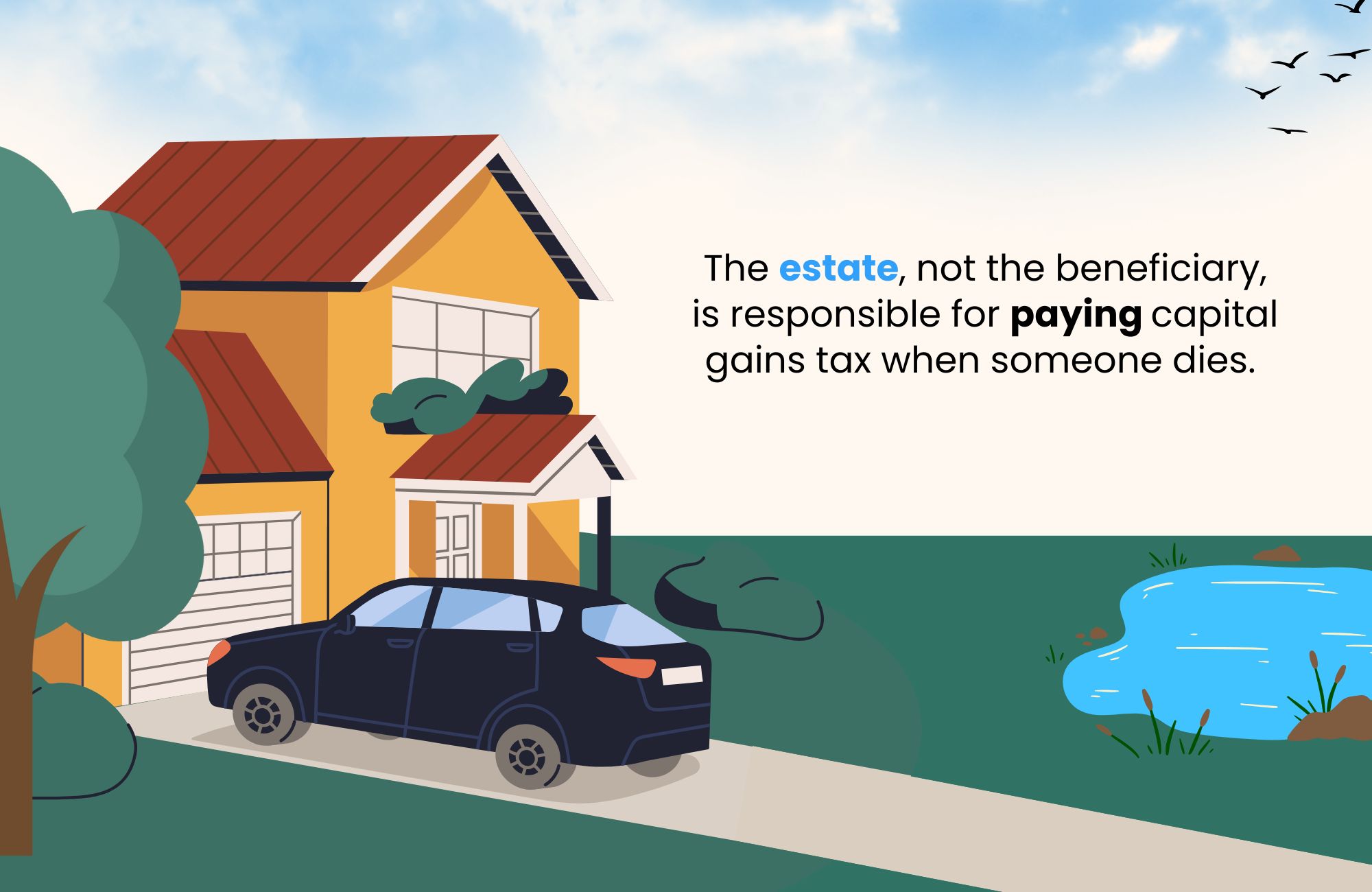
How Can You Avoid Capital Gains Tax on the Sale of an Inherited Property in Ontario?
1. Principal Residence Exemption
If the inherited property qualifies as a principal residence, you may claim the exemption and avoid capital gains tax. To qualify, the property must have been designated as a principal residence during the years of ownership.
2. Transfer Property to a Spouse or Common-Law Partner with a Rollover
When property passes to a surviving spouse or partner, it can be transferred tax-free under the spousal rollover. This defers the tax until the property is sold or until the second spouse passes away.
3. Use a Trust
An Alter Ego Trust or Joint Partner Trust allows individuals to transfer property during their lifetime without immediate capital gains tax. These trusts defer the tax until death and may allow for income-splitting or flexible control of estate assets.
4. Hold the Property Long-Term
Selling the property immediately after inheritance may trigger a large tax bill. By holding the property, you defer capital gains tax until a future sale, which gives flexibility in timing and potential tax advantages if rates or personal income change.
5. Consider Renovations and Adjusted Cost Base
Any documented renovations or capital improvements can be added to the adjusted cost base (ACB) of the property. This reduces the taxable gain when the property is eventually sold.
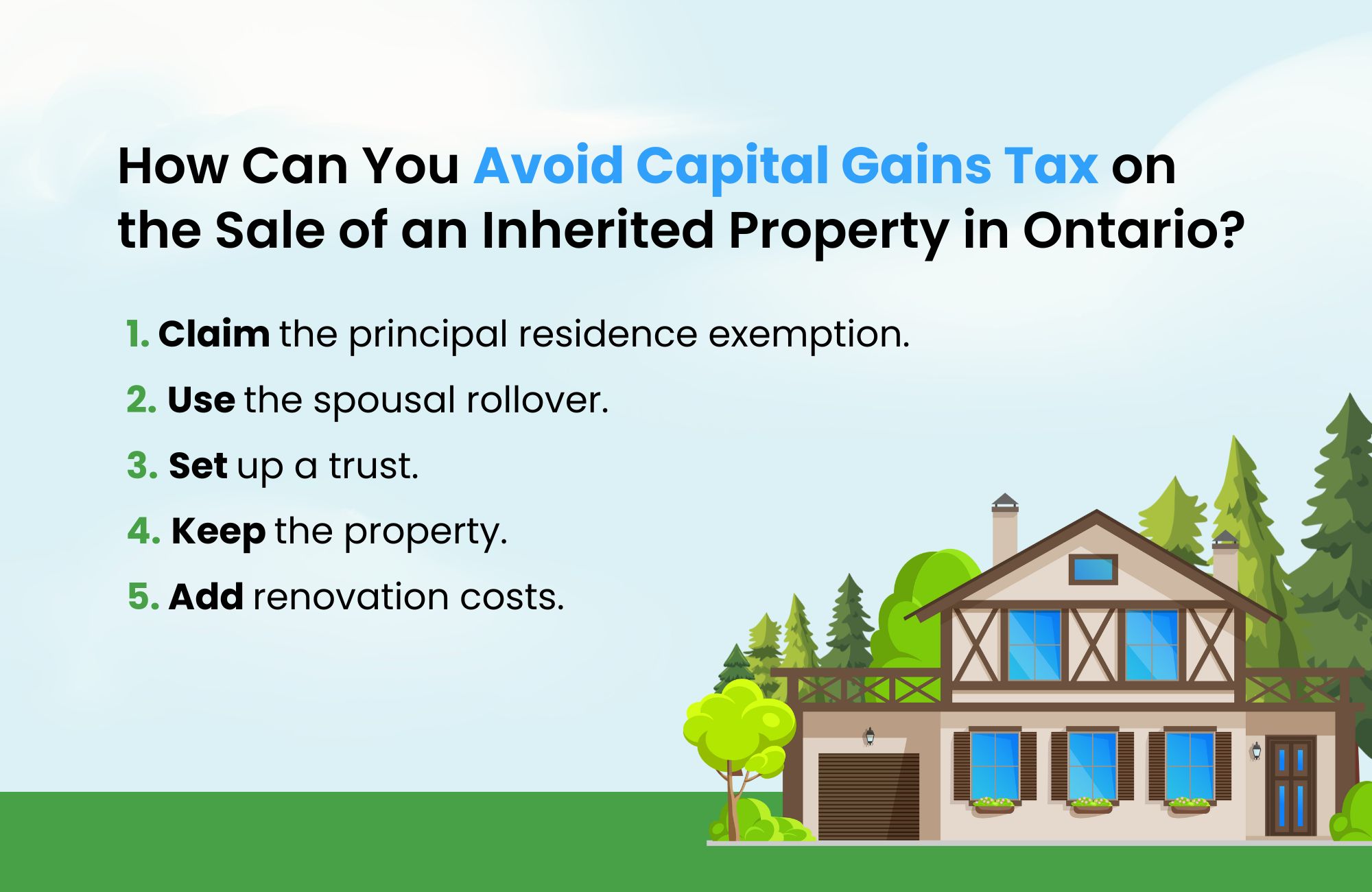
What Can You Do about Taxes If You’re Inheriting a House with Siblings?
If your parents have not planned ahead, you and your siblings may face a large tax bill when the house is inherited.
Before a parent dies, planning with wills, trusts, or life insurance can ensure the estate has liquidity to pay taxes. If nothing is in place, the deceased’s estate may have to sell the house to pay taxes, unless the siblings contribute funds together to cover the liability.
Working together and documenting ownership clearly after inheritance is essential to avoid conflict and unexpected income tax issues.
Are Capital Gains Taxes Due Immediately Upon Inheritance?
Yes, but they’re paid by the estate, not the person inheriting the property.
When someone passes away, the CRA treats their property as if it were sold at fair market value on the date of death. This triggers a capital gain if the property has increased in value since it was originally purchased. That tax must be reported and paid on the deceased’s final (terminal) tax return.
The estate has until April 30 of the year after death, or six months after the date of death, whichever is later, to file the return and pay any tax owing. If the estate doesn’t have enough liquid assets to pay the capital gains tax, the property may need to be sold to cover the bill.
The CRA won’t issue a clearance certificate (which is needed to officially close the estate) until all taxes are paid.
Once the estate settles the taxes, the person inheriting the property receives it at its current fair market value. That means you won’t owe capital gains tax until you sell the property, and only on any increase in value from the date you inherited it.
Tax Planning Tips So You Can Take Action
- Talk to an estate planner or tax professional
- Keep renovation and purchase records
- Review title ownership such as joint tenants
- Consider insurance to cover future tax liability
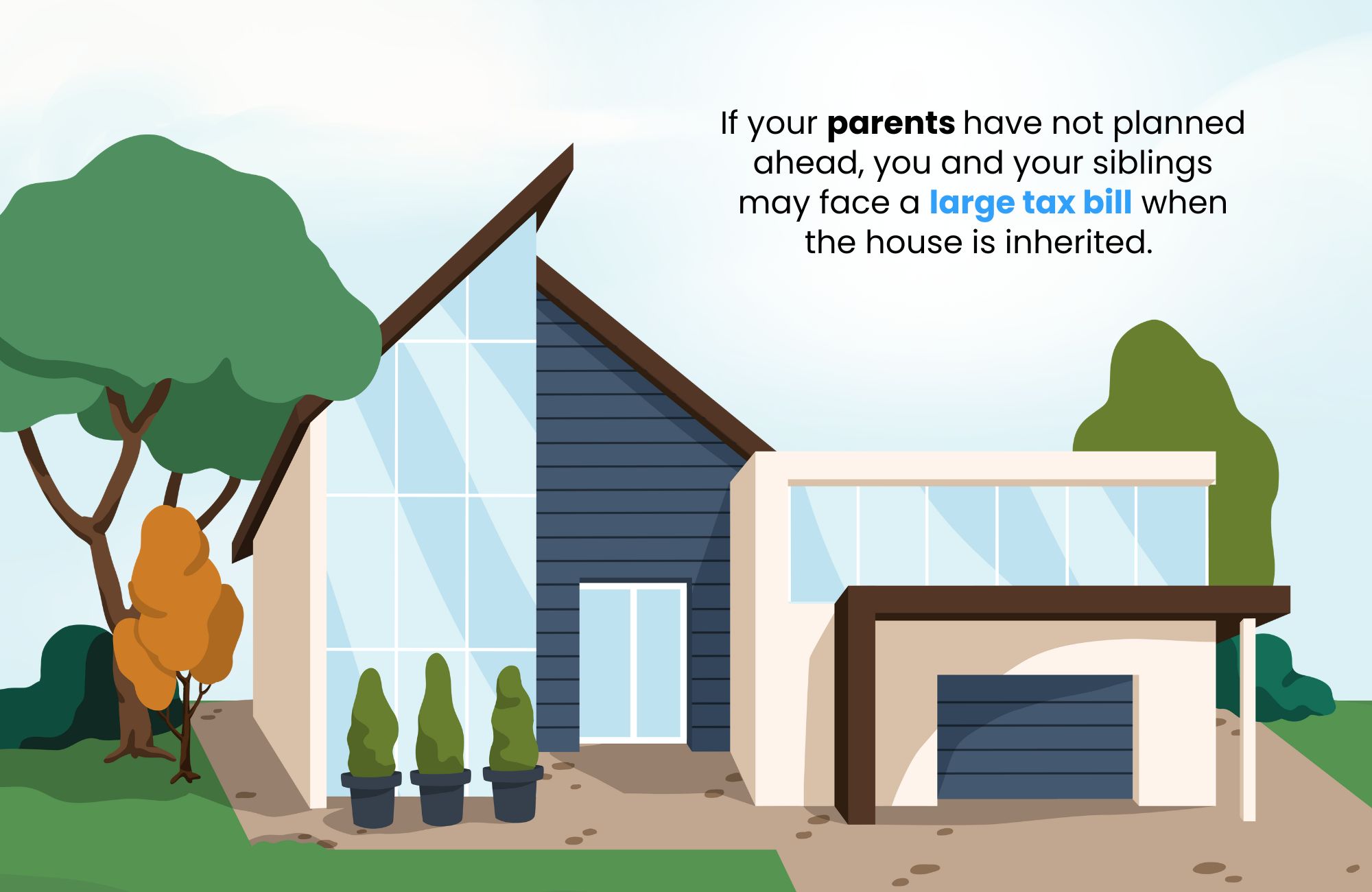
Common Questions about Capital Gains Taxes in Ontario
Yes, property can transfer tax-free to a spouse or common-law partner through a spousal rollover. This defers the capital gains until the surviving spouse dies or sells the property.
Yes, certain trusts such as Alter Ego or Joint Partner Trusts can defer when capital gains tax is triggered. They can also provide control and potential income-splitting advantages for estate planning.
No, inheritance is not considered taxable income and Canada does not have an inheritance tax. However, estate taxes and capital gains may reduce what is passed on before you receive it.
You only pay tax on the increase in value after the date you inherit the property. The estate covers any capital gains that existed before death.
Inheriting is usually better because gifting during life can immediately trigger capital gains tax. With inheritance, the estate pays taxes and you receive the property at a new fair market value.
If the estate lacks liquid assets, property or investments may need to be sold to cover the tax. The CRA requires taxes to be paid before assets are distributed.
Fifty percent of the gain is added to taxable income on the return. The amount of tax you pay depends on the marginal income tax rate of the deceased or beneficiary at the time of sale.
Yes, permanent life insurance is often used to create tax-free funds to pay estate taxes. This prevents families from having to sell estate assets to cover the liability.
When you inherit property, the cost base resets to the fair market value at the date of death. This means you only pay tax on growth that happens after you inherit it.
Yes, a cottage can be designated as the principal residence if it meets CRA rules. However, only one property can be claimed as a principal residence at a time

Final Thoughts
Capital gains are one of the most significant estate taxes in Ontario, and they are paid by the estate through the deceased’s final return.
Beneficiaries inherit property at its new fair market value, which means they will only pay taxes on future growth. Strategies like spousal rollover, the principal residence exemption, trusts, and insurance can help reduce or defer the tax burden.
Careful planning before death is the best way to protect family wealth and avoid unnecessary stress.
Key Takeaways
- Proper estate planning protects family wealth and prevents forced sales
- Capital gains tax applies at death on fair market value of property
- The estate pays taxes before property is passed to beneficiaries
- Inherited property gets a new cost base at inheritance date
- Planning tools like rollover, trusts, and insurance can reduce taxes
Discover How to Minimize Taxes and Secure Your Legacy
Did you know that without a solid estate plan, taxes and fees in Ontario could claim a significant portion of your wealth?
If you’ve worked hard to build your business, investments, and properties, protecting your legacy for your loved ones is critical. At Strategic Wealth Protection Partners, we specialize in helping high-net-worth individuals in Ontario secure their financial futures.
Our Living Estate Plan is designed to:
- Reduce estate taxes and probate fees.
- Simplify wealth transfer to your loved ones.
- Reflect your values and priorities in every detail.
Your Legacy Matters
With our personalized guidance, we’ll help you navigate options like Living Trusts to protect your assets and ensure your family’s peace of mind. Contact us today to book your Living Estate Plan Consultation and take the first step toward a secure future.
Schedule a Living Estate Plan Consultation
Planning your legacy is about more than numbers—it’s about ensuring your family remembers you and your values are honoured for many years to come.
Estate planning and trusts can feel overwhelming, especially if it’s your first time. That’s why we’re here.
With our simple, 5-Step Living Estate Plan, we make the process easy, helping you create a comprehensive estate plan or trust that protects your assets from taxes and probate fees while preserving your legacy. Tools like The Final Word Journal capture your story, wishes, and essential details like accounts and end-of-life plans, ensuring your family has clarity and comfort.
Take the first step today—schedule a consultation call and give your family the ultimate gift: peace of mind and the assurance they were always your priority.
Read More
If you’re starting your estate planning process, you may find these articles helpful:
- Can I Gift a House to My Son or Daughter Without Paying Taxes in Canada?
- How Do I Avoid Capital Gains Tax on Inherited Property in Canada?
- How to Avoid Capital Gains on a Cottage in Ontario
About the Author
RON COOKE, PRESIDENT & FOUNDER OF STRATEGIC WEALTH PROTECTION PARTNERS

With over 30 years in financial services, I’ve seen the challenges families face when a loved one passes—lost assets, unnecessary taxes, and emotional stress. That’s why I created the Living Estate Plan, a comprehensive process to protect assets, eliminate estate and probate fees, and create legacies that are remembered for many years to come.
This plan ensures your family receives not just your wealth, but a meaningful reminder of your care and love. Tools like The Final Word Journal capture your story, wishes, and essential details, offering clarity and comfort during difficult times.
Your final gift should be more than money—it should be peace of mind, cherished memories, and an organized estate.
Schedule a Call
Schedule a 30-minute consultation call with Strategic Wealth Protection Partners.
Click HERE to schedule a consultation.


